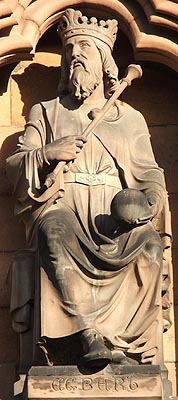
EBK Home
Kingdoms
Royalty
Saints
Pedigrees
Archaeology
King Arthur
Adversaries
Mail David
 Egbert, King of Wessex
Egbert, King of Wessex& the English
(Died AD 839)
Egbert was born in the reign of King Cynewulf of Wessex. He was the son of Aelmund, a minor prince of the Royal House, descended from Ingeld, the brother of the late and great King Ine. Not much is known about his early life, but both he and his father appear to have become embroiled in political intrigues of the period. Egbert's mother was probably a daughter of King Aethelbert II of Kent and, hence, Aelmund was able to claim the joint-Kingship of Kent between AD 784-5. Soon afterward, Egbert made a play for the throne of Wessex, but his rebellion did not gain support and he was forced to flee the country.
For almost twenty years, Egbert lived in exile at the Frankish Court of the Emperor Charlemagne. Only in AD 802, upon the death of King Bertric, was he finally able to return to England and seize the Wessex throne. His authority seems to have been accepted rather quickly, perhaps because of a lack of alternative heirs.
The kingdom prospered for the next twenty-three years. Egbert used his time wisely, consolidating his position and building a powerful army. By AD 825, the power of Mercia was waning. The midland kingdom had seen four different monarchs in the space of two years and Egbert quickly recognised the opportunity which had presented itself. At Wroughton in Wiltshire, his armies clashed with the Mercians under King Beornwulf. The latter was thoroughly defeated at the Battle of Ellandon; and Egbert went on to press his home his advantage. His armies first ousted King Baldred from Kent and then turned on Cornish Dumnonia, whom they fought at Gafelford (either Galford in Devon or Camelford in Cornwall). The resulting kudos soon led to a major transfer of allegiance as Sussex, Surrey and Essex all submitted to West Saxon overlordship.
Egbert gave his new south-eastern provinces to his eldest son, Aethelwulf, to rule, while he concentrated once more on attacking Mercia. The midland kingdom had now been further weakened by war by East Anglia and, in AD 828, Egbert's army was able to take over its lands with ease. King Wiglaf of Mercia fled and the Wessex armies moved still further north to threaten Northumbria. Their King, Enred, was defeated at the battle of the River Dore and forced to recognise Egbert as his overlord. He is thus recorded in the Anglo-Saxon Chronicle as the eighth of the Bretwaldas.
However, the control of Mercia direct from Wessex was an almost impossible task and, by AD 830, Wiglaf had already managed to re-establish his rule there. Egbert seems to have accepted the situation, probably still considering himself to be Wiglaf's overlord. In any case, he soon had his hands full dealing with a new opponent. For, in AD 836, the Vikings arrived in West Saxon North Devon and Somerset. Egbert's army fought them at the Battle of Carhampton, but things did not go well and he was forced to withdraw. Two years later, the threat became even more serious when the Cornish Dumnonians joined forces with the Northmen. This time, however, Egbert was the decisive victor at the Battle of Hingston Down.
Egbert died the following year and he was buried in the Old Minster at Winchester. He had married a lady named Redburga and they had at least two children: Aethelwulf, who succeeded his father as King of the English, and St. Edith of Polesworth.
